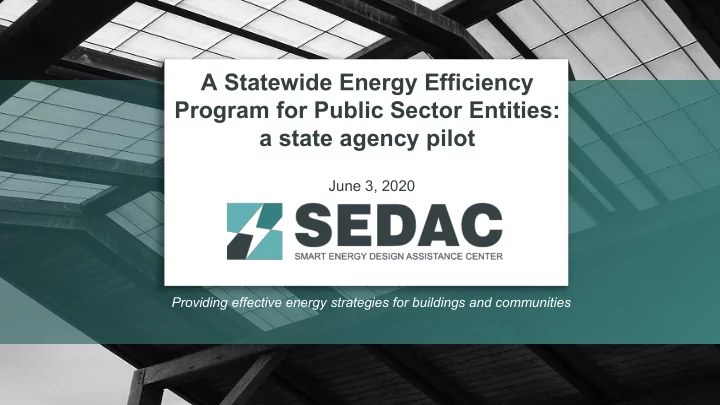

A Statewide Energy Efficiency Program for Public Sector Entities: a state agency pilot June 3, 2020 Providing effective energy strategies for buildings and communities
Who we are Smart Energy Design Assistance Center (SEDAC) Our mission: Reduce the energy footprint of Illinois We assist buildings and communities in achieving energy efficiency, saving money, and becoming more sustainable. We are an applied research and training program at University of Illinois.
SEDAC Experience and Background Energy saving programs, education, and research in Illinois since 2004 Energy Efficiency Programs Other Gov Agency Programs • DCEO Small Business Smart Energy and • Illinois EPA Office of Energy Wastewater Assessment Program and Energy Code Education Public Sector EEPS and Training • ComEd EE Programs and Emerging Tech • US DOE Energy Code Training • Ameren IL Public Sector Assessments and • Solar Feasibility (Illinois state agencies) Workforce Development • Net Zero Climate Action Planning (Illinois state • 2,700+ assessments & RCx for public and agencies and IGEN community colleges) commercial facilities • Savings: 2.4 billion kWh, 120 million therms, $300 million energy costs
Idea: Statewide Energy Efficiency Program for Public Sector Illinois public sector would benefit from a single, cohesive comprehensive statewide program New proposed program approach would apply to all utilities Start with a pilot for Illinois state agencies
The problem: public ≠ commercial Slower decision-making processes Annual and multi-year budgetary & implementation cycles 2-5 years to implementation is typical
The problem: public ≠ commercial Fiscal constraints Staff constraints Budget cuts May lack staff or expertise • • Contractor procurement Need advice before proceeding with • • Need for transparency measures • Need for board approval Need support for navigating • • contracting, financing, administrative requirements
The problem: public ≠ commercial Different attitudes Building trust Public interest is primary goal • • “Advice” rather than “sales” approach Opportunity to tap into public • • Look to sources they can trust (e.g., U of I) benefits of energy efficiency Money is a constraint, not a goal in • More trust = greater implementation • of complex or capital-intensive itself measures Ability & interest in engaging in • • Trust grows over time longer paybacks, deeper savings
The problem: public ≠ commercial Comments from Utility Program Quarterly Reports “Public sector projects often require a longer sales cycle “Education and delivering on assessment reports due to the more stringent procurement procedures and starts the dialogue, but takes time for capital due diligence. Approval from multiple decision makers improvement dollars to be approved, before projects that meet on a set schedule is typically required.” hit the pipeline.” ComEd Q1 (2018) Quarterly Report: Public Sector Small Nicor Q1 (2019) Quarterly Report: BEER Custom Facilities Incentives “Long procurement timelines in the public sector make “The program is finding challenges with public sector it difficult to implement low hanging fruit measures.” engagement.” NSG/PG Q1 (2019) Quarterly Report: Business – Public ComEd Q2 (2019) Quarterly Report: Public Sector Custom Sector
The problem: public ≠ commercial The result: higher program costs Public sector energy efficiency programs cost more because there is a need for more services, targeted support, and higher incentives. Program costs of public sector vs C&I for 41 states from 2009-2015 Public Sector* Program Mixed C&I Prescriptive Mixed C&I Custom Administrator costs $0.041/kWh** $0.019/kWh** $0.022/kWh** *The report refers to Municipal, University, Schools, and Hospitals **In 2006 dollars Source: Hoffman, et al. (2018). “The Cost of Saving Electricity Through Energy Efficiency Programs Funded by Utility Customers: 2009-2015.” LBNL
How did they compare? DCEO vs. utility programs in other states DCEO results • Experienced, statewide, targeted public sector approach • Effectiveness increased over time • Cost effective TRC track record • High performance: Cost/kWh 40% lower than national average, according to a 2014 LBNL study.* * Billingsley, M. et al. (2014). The Program Administrator Cost of Saved Energy for Utility Customer-Funded Energy Efficiency Programs. LBNL-6595E
How do they compare? DCEO vs. current Illinois utility programs Utility results Utility public sector program data hard to find “Program Administrators are encouraged to report public sector savings at the program level, where available.” More analysis needed Data to compare engagement, spending & savings between DCEO • public sector and utility program public sector Public sector stakeholder engagement needs assessment •
Idea: Statewide Energy Efficiency Program for Public Sector We propose a statewide public sector program that is Cohesive across utility territories • with a single program contact Responsive to public sector issues • and timelines We propose that the program be piloted with state agencies .
Idea: Statewide Energy Efficiency Program for Public Sector Why start with state agencies? • State agencies have a single statewide portfolio of buildings that are spread across utility boundaries. • Multiple utilities reach out to state agencies, creating fragmentation and confusion. • State agency energy use has increased since the disruption of DCEO Public Sector EEPS in FY2016* There’s an opportunity to streamline energy efficiency programs for state agencies. (*SmartState Energy Report, Illinois Department of Central Management Services
Idea: Statewide Energy Efficiency Program for Public Sector Approach & benefits • Get buy-in from all utilities • Provide single point of contact to improve efficiency and reduce customer confusion • Provide tailored support for comprehensive benefits for public sector building portfolios • Coordinate incentive assistance and capital planning to respond to budget cycles and for better EE program forecasting • Delivered by trusted public sector entity
Idea: Statewide Energy Efficiency Program for Public Sector Savings potential State agencies Public sector • State agencies consume Public sector facilities consume • 550,000 MWh/yr and 25 14,000,000 MWh/yr and 570 million therms/yr * million therms/yr** 1% annual savings: 140,000 • • 1% annual savings: 5.5 MWh and 5.7 million therms million kWh & 0.25 million therms (*SmartState Energy Report, Illinois Department of Central Management Services. Does not include rural coops and munis. ** Energy Resources Center, 2016: Illinois Public Sector & Low-Income Housing Energy Efficiency Potential Study
Thank you! Questions? Brian Deal, Executive Director deal@illinois.edu
Recommend
More recommend